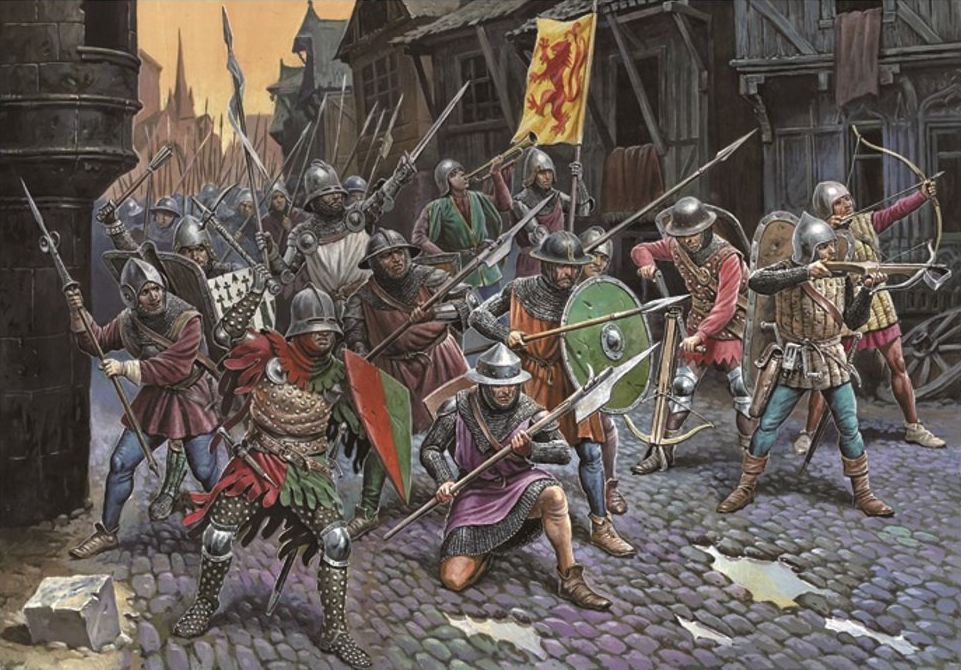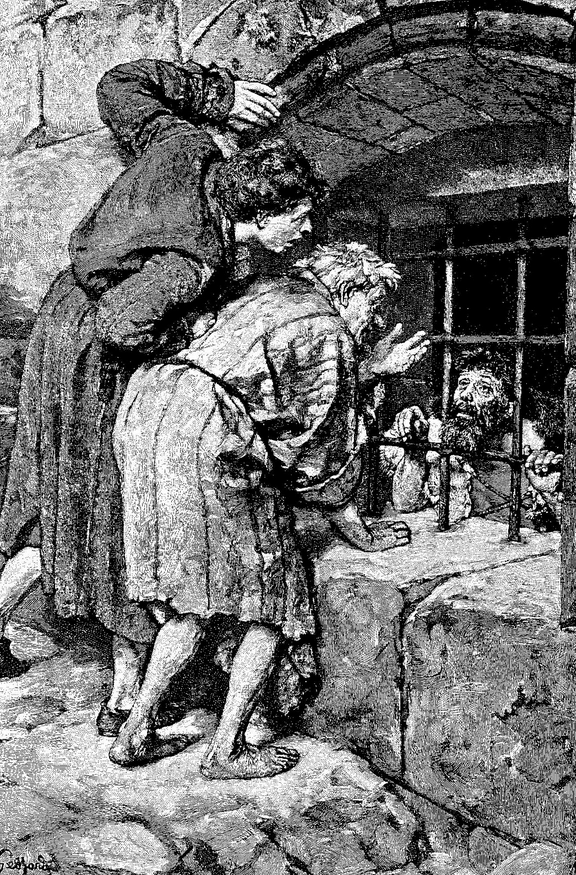Editor’s note: The following is extracted from Military Manners and Customs, by James Anson Farrer (published 1885). It is offered here not for its semi-pacifist perspective, but as a useful corrective to the romanticized view of medieval warfare. All spelling in the original.
It is indeed passing strange that Christianity, which could command so strict an observance of its ordinances as is implied in the transport of boats to catch fish for Lent, should have been powerless to place any check whatever on the ferocious militarism of the time; and the very little that was ever done by the Church to check or humanise warfare is an eternal reflection on the so-called conversion of Europe to Christianity. Nevertheless the Church, to do her justice, used what influence she possessed on the side of peace in a manner she has long since lost sight of; nor was the Papacy in its most distracted days ever so indifferent to the evils of war as the Protestant Church has been since, and is still. Clement VI succeeded in making peace between France and England, just as Alexander III averted a war between the two countries in 1161. Innocent VI tried to do the same; and Urban V returned from Rome to Avignon, hoping to effect the same good object. Gregory XI was keenly distressed at the failure of efforts similar to those of his predecessors. The Popes indeed endeavoured to stop wars, as they endeavoured to stop tournaments, or the use of the crossbow; but they were defeated by the intense barbarism of chivalry; nor can it be laid to the charge of the Church of Rome, as it can to that of the Church of the Reformation, that she ever folded her hands in despairful apathy before a custom she admitted to be evil. The cardinals and archbishops of those days were constantly engaged in pacific, nor always futile, embassies. And the prelates would frequently preach to either side arguments of peace: a fact that contrasts badly with the almost universal silence and impotence of the modern pulpit, either to stay a war or to mitigate its barbarities.
But it is true that they knew equally well how to play on the martial as on the pacific chord in their audiences; for the eloquence of an Archbishop of Toulouse turned sixty towns and castles to the interest and rights of the French king in his quarrel with England; and the preaching of prelates and lawyers in Picardy had a similar effect in other large towns. Nor were the English clergy slower than the French to assert the rights of their king and country, for Simon Tibald, Bishop of London, made several long and fine sermons to demonstrate (as always is demonstrated in such cases) that the King of France had acted most unjustly in renewing the war, and that his conduct was at total variance both with equity and reason.
But these appeals to the judgment of their congregations by the clergy are also a proof that in the fourteenth century the opinion of the people did not count for so little as is often supposed in the making of peace and war. Yet the power of the people in this respect was doubtless as insignificant as it still is in our own days: nothing being more remarkable, even in the free government of modern England, than the influence of the people in theory and their influence in fact on the most important question that regards their destinies.
Nor are the moral causes difficult to trace which in those times made wars break out so frequently and last so long, that those who now read of them can only marvel how civilisation ever emerged at all, even to the imperfect degree to which it is given to us to enjoy it. The love of adventure and the hope of fame were of course among the principal motives. The saying of Adam Smith, that the great secret of education is the direction of personal vanity to proper objects, contains the key to all advance that has ever been made in civilisation, and to every shortcoming. The savagery of the middle ages was due to the direction of personal vanity exclusively into military channels, so that the desire for distinction often displayed itself in forms of perfect absurdity, as in the case of the young English knights who went abroad with one eye veiled, binding themselves by a vow to their ladies neither to see with their eyes nor to reply to anything asked of them till they had signalised themselves by the performance of some wondrous deed in France. The gradual opening up in later days of other paths to distinction than that of arms has very much diminished the danger to the public peace involved in the worthless education of our ancestors.
Nor was the personal distinction of the warrior gained at any great risk of personal danger. The personal danger in war decreased in exact ratio with the rank of the combatant, and it was only the lower orders of the social hierarchy who unreservedly risked their lives. In case of defeat they had no ransom to offer for mercy, and appear almost habitually to have been slain without any. If it was a common thing for either side to settle before a battle the names of those on the other who should be admitted to ransom, it was no uncommon thing to determine, as the English did before Crecy, to give no quarter to the enemy at all. But as a rule the battle-field was of little more peril to the knight than the tournament; and though many perished when powerless to avert the long thin dagger, called the miséricorde, from the interstices of their armour or the vizor of their helmets, yet the striking fact in Froissart is the great number of battles, skirmishes, and sieges in which the same names occur, proving how seldom their bearers were wounded, disabled, or killed. This of course was due mainly to the marvellous defensive armour they wore, which justifies the wonder not merely how they fought but even how they moved. Whether encased in coats of mail, sewn upon or worn over the gambeson or thick undergarment of cloth or leather, or in plates of solid steel, at first worn over the mail and then instead of it, and often with the plastron or breastplate of forged iron beneath both hauberk and gambeson, they evidently had little to fear from arrow, sword, or lance, unless when they neglected to let down the vizor of the helmet, as Sir John Chandos did, when he met with his death from a lance wound in the eye (1370). Their chief danger lay in the hammering of battle-axes on their helmets, which stunned or wounded, but seldom killed them. But the foot soldiers and light cavalry, though generally well equipped, were less well protected by armour than the knights, the hauberk or coat of mail being allowed in France only to persons possessed of a certain estate; so that the knights were formidable less to one another than to those who by the conditions of the combat could not be so formidable to themselves.
The surcoat was also a defence to the knight, as indicating the ransom he could pay for his life. Otherwise it is impossible to account for his readiness to go into action with this long robe flowing over his plate of steel and all his other accoutrements. Had Sir John Chandos not been entangled in his long surcoat when he slipped, he might have lived to fight many another battle to the honour of English chivalry. Richness of armour served also the same purpose as the surcoat. At the battle of Nicopoli, when the flower of the French nobility met with so disastrous a defeat at the hands of the Turks, the lords of France were, says Froissart, so richly dressed out in their emblazoned surcoats as to look like little kings, and many for a time owed their lives to the extreme richness of their armour, which led the Saracens to suppose them greater lords than they could really boast to be. So again the elaborate gold necklaces worn by distinguished officers in the seventeenth century were probably rather symbols of the ransom their wearers could pay, than worn merely for ostentation and vanity. It was to carelessness on this score that the Scotch owed their great losses at the battle of Musselborough in 1548: for (to put the words of Patin in modern dress) their ‘vileness of port was the cause that so many of the great men and gentlemen were killed and so few saved. The outward show, the semblance and sign whereby a stranger might discern a villain from a gentleman, was not among them to be seen.’
War under these conditions chiefly affected the lives of the great by pleasantly relieving the monotony of peaceful days. In time of peace they had few occupations but hawking, hunting, and tilting, and during hostilities those amusements continued. Field sports, sometimes spoken of by their eulogists as the image of war, were not absent during its reality. Edward III hunted and fished daily during his campaign in France, having with him thirty falconers on horseback, sixty couples of staghounds, and as many greyhounds. And many of his nobles followed his example in taking their hawks and hounds across the Channel.
But the preceding causes of the frequency of war in the days of chivalry are quite insignificant when compared with that motive which nowadays mainly finds vent in the peaceful channels of commerce—namely, the common desire of gain. The desire for glory had far less to do with it than the desire of lucre; nor is anything from the beginning to the end of Froissart more conspicuously displayed than the merely mercenary motive for war. The ransom of prisoners or of towns, or even ransom for the slain, afforded a short and royal road to wealth, and was the chief incentive, as it was also the chief reward of bravery. The Chevalier Bayard made by ransoms in the course of his life a sum equal to 4,000l., which in those days must have been a fortune; and Sir Walter Manny in a single campaign enriched himself by 8,000l. in the same way. So that the story is perfectly credible of the old Scotch knight, who in a year of universal peace prayed, ‘Lord, turn the world upside down that gentlemen may make bread of it.’ Loot and rapine, the modern attractions of the brigand, were then in fact the main temptations of the knight or soldier; and the distinction between the latter and the brigand was far less than it had been in the pre-Christian period, or than it is in more modern times. Indeed the very word brigand meant, originally, merely a foot-soldier who fought in a brigade, in which sense it was used by Froissart; and it was only the constant addiction of the former to the occupations of the highwayman that lent to the word brigand its subsequent evil connotation.
But it was not merely the common soldier to whom the first question in a case of war was the profit to be gained by it; for men of the best families of the aristocracy were no less addicted to the land piracy which then constituted war, as is proved by such names as Calverly, Gournay, Albret, Hawkwood, and Guesclin. The noble who was a soldier in war often continued to fight as a robber after peace was made, nor thought it beneath him to make wretched villagers compound for their lives; and in spite of truces and treaties, pillage and ransom afforded his chief and often his sole source of livelihood. The story of Charles de Beaumont dying of regret for the ransom he had lost, because by mistake he had slain instead of capturing the Duke of Burgundy at the battle of Nancy, is a fair illustration of the dominion then exercised by the lowest mercenary feelings over the nobility of Europe.
This mercenary side of chivalrous warfare has been so lost sight of in the conventional descriptions of it, that it is worth while to bring into prominence how very little the cause of war really concerned those who took part in it, and how unfounded is the idea that men troubled to fight for the weak or the oppressed under fine impulses of chivalry, and not simply in any place or for any object that held out to them the prospect of gain. How otherwise is it possible to account for the conduct of the Black Prince, in fighting to restore Pedro the Cruel to the throne of Castile, from which he had been displaced in favour of Henry of Trastamare not merely by the arms of Du Guesclin and the French freebooters, but by the wishes and consent of the people? Any thought for the people concerned, or of sympathy for their liberation, as little entered into the mind of the Black Prince as if the question had concerned toads or rabbits. Provided it afforded an occasion for fighting, it mattered nothing that Pedro had ruled oppressively; that he had murdered, or at least was believed to have murdered, his wife, the sister of the reigning King of France: nor that he had even been condemned by the Pope as an enemy to the Christian Church. Yet before the battle of Navarette (1367), in which Henry was completely defeated, the Prince did not hesitate in his prayers for victory to assert that he was waging war solely in the interests of justice and reason; and it was for his success in this iniquitous exploit (a success which only awaited his departure from the country to be followed by a rising in favour of the monarch he had deposed) that the Prince won his chief title to fame; that London exhausted itself in shows, triumphs, and festivals in his honour; and that Germans, English, and Flemish with one accord entitled him ‘the mirror of knighthood.’ The Prince was only thirteen when he fought at Crecy, and he fought with courage: he was only ten years older when he won the battle of Poitiers, and he behaved with courtesy to the captive French king, from whom he looked for an extortionate ransom: but the extravagant eulogies commonly heaped upon him prove how little exalted in reality was the military ideal of his age. His sack of Limoges, famous among military atrocities, has already been spoken of; nor should it be forgotten, as another indication of his character, that when two messengers brought him a summons from the King of France to answer the appeal of the Gascons of Aquitaine, he actually imprisoned them, showing himself however in this superior to his nobles and barons, who actually advised capital punishment as the fittest salary to the envoys for their pains.
The Free Companies, or hordes of robbers, who ravaged Europe through all the period of chivalry and constituted the greatest social difficulty of the time, were simply formed of knights and men-at-arms, who, when a public war no longer justified them in robbing and murdering on behalf of the State, turned robbers and murderers on their own account. After the treaty of Bretigny had put a stop to hostilities between France and England (1360), 12,000 of these men, men of rank and family as well as needy adventurers, and under leaders of every nationality, resolved sooner than lay down their arms to march into Burgundy, there to relieve by the ransoms they might levy the poverty they could not otherwise avert. Many a war had no other justification than the liberation of one people from their outrages by turning them upon another. Thus Du Guesclin led his White Company into Spain on behalf of Henry the Bastard, less to avenge the cruelties of Pedro than to free France from the curse of her unemployed chivalry; and Henry the Bastard, when by such help he had wrested the kingdom of Castile from his brother Pedro, designed an invasion of Granada simply to divert from his own territories the allies who had placed him in possession of them. This was a constant source of war in those days, just as in our own the existence of large armies leads of necessity to wars for their employment; and even the Crusades derive some explanation from the operation of the motive indicated.
No historical microscope, indeed, will detect any difference between the Free Companies and the regular troops, since not only the latter merged into the former, but both were actuated by the sole pursuit of gain, and equally indifferent to ideas of honour or patriotism. The creed of both was summed up in the following regretful speech, attributed to Aymerigot Marcel, a great captain of the pillaging bands: ‘There is no pleasure in the world like that which men such as ourselves enjoyed. How happy were we when, riding out in search of adventures, we met a rich abbot, a merchant, or a string of mules, well laden with draperies, furs, or spices, from Montpellier, Beziers, and other places! All was our own, or ransomed according to our will. Every day we gained money, … we lived like kings, and when we went abroad the country trembled; everything was ours both in going and returning.’
In the days of chivalry, this desire of gain, however gotten, pervaded and vitiated all classes of men from the lowest to the highest. Charles IV of France, when his sister Isabella, queen of Edward II, fled to him, promised to help her with gold and silver, but secretly, lest it should bring him into war; and then when messengers from England came with gold and silver and jewels for himself and his ministers, both he and his council became in a short time as cold to the cause of Isabella as they had been warm, the king even going so far as to forbid any of his subjects under pain of banishment to help his sister in her projected return. And again, when Edward III was about to make war with France, was he not told that his allies were men who loved to gain wealth, and whom it was necessary to pay beforehand? And did he not find that a judicious distribution of florins was as effective in winning over to his interests a duke, a marquis, an archbishop, and the lords of Germany, as the poorer citizens of the towns of Flanders?
Money, therefore, or its equivalent, and not the title to the crown of France, was at the root of the wars waged abroad by the English under Edward III. The question of title simply served as pretext, covering the baser objects of the invasion. No historical fact is clearer, ignored though it has been in the popular histories of England, than that the unpopularity of his successor, Richard II, arose from his marriage with the daughter of the King of France, and from his desire for peace between the two kingdoms, of which the marriage was the proof and the security. When his wish for peace led to the formation of a war and a peace party among the English nobility, Froissart says: ‘The poorer knights and archers were of course for war, as their sole livelihood depended upon it. They had learnt idleness and looked to war as a means of support.’ In reference to the great peace conference held at Amiens in 1391, he observes: ‘Many persons will not readily believe what I am about to say, though it is strictly true, that the English are fonder of war than of peace. During the reign of Edward, of happy memory, and in the lifetime of his son the Prince of Wales, they made such grand conquests in France, and by their victories and ransoms of towns, castles, and men gained such wealth, that the poorest knights became rich; and those who were not gentlemen by birth, by gallantly hazarding themselves in these wars, were ennobled by their valour and worth. Those who came after them were desirous of following the same road…. Even the Duke of Gloucester, son of King Edward, inclined to the opinion of the commons, as did many other knights and squires who were desirous of war to enable them to support their state.’
No other country, indeed, pleased these English brigand knights so well as France for the purpose of military plunder. Hence the English who returned from the expedition to Castile complained bitterly that in the large towns where they expected to find everything, there was nothing but wines, lard, and empty coffers; but that it was quite otherwise in France, where they had often found in the cities taken in war such wealth and riches as astonished them; it was in a war with France therefore that it behoved them to hazard their lives, for it was very profitable, not in a war with Castile or Portugal, where there was nothing but poverty and loss to be suffered.
With this evidence from Froissart may be compared a passage from Philip de Commines, where he says, in speaking of Louis XI towards the end of the following century: ‘Our master was well aware that the nobility, clergy, and commons of England are always ready to enter upon a war with France, not only on account of their old title to its crown, but by the desire of gain, for it pleased God to permit their predecessors to win several memorable battles in this kingdom, and to remain in possession of Normandy and Guienne for the space of 350 years, … during which time they carried over enormous booty into England. Not only in plunder which they had taken in the several towns, but in the richness and quality of their prisoners, who were most of them great princes and lords, and paid them vast ransoms for their liberty; so that every Englishman afterwards hoped to do the same thereby and return home laden with spoils.’
Such, then, were the antecedents of the evil custom of war which has descended to our own time; and we shall have taken the first step to its abolition when we have thus learnt to read its real descent and place in history, and to reject as pure hallucination the idea that in the warfare of the past any more than of the present there was anything noble or great or glorious. That brave deeds were often done and noble conduct sometimes displayed in it must not blind us to its other and darker features. It was a warfare in which not even women and children were safe from the sword or lance of the knight or soldier; nor sacred buildings exempt from their rage. It was a warfare in which the occasional mercy shown had a mercenary taint; in which the defeated were only spared for their ransom; and in which prisoners were constantly liable to torture, mutilation, and fetters. Above all, it was a warfare in which men fought more from a sordid greed of gain than from any love or attachment to their king or country, so that all sense of loyalty would speedily evaporate if a king like Richard II chanced to wish to live peaceably with his neighbours.
It is not unimportant to have thus shown the warfare of chivalry in its true light. For it is the delusion with regard to it, which more than anything else keeps alive those romantic notions about war and warriors that are the most fatal hindrance to removing both from the face of the earth. We clearly drive militarism to its last defences, if we deprive it of every period and of almost every name on which it is wont to rely as entitling it to our admiration or esteem.









